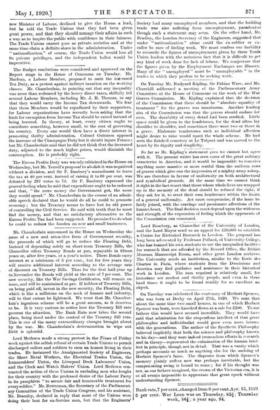Mr. Chamberlain announced in the House on Wednesday the issue
of a new and attractive form of Government security, the proceeds of which will go to reduce the Floating Debt. Instead of depending solely on short-term Treasury Bills, the Chancellor offers Treasury Bonds at par, repayable in fifteen years or, after five years, at a year's notice. These Bonds carry interest at a minimum of 5 per cent., but for five years they will receive additional interest according to the average rate of discount on Treasury Bills. Thus for the first half-year up to November the Bonds will yield at the rate of 7 per cent. The new security, like the War Savings Certificates, will remain on issue, and will be maintained at par. If holders of Treasury Bills, on being paid off, invest in the new security, the Floating Debt, which is like a millstone on the neck of finance and industry, will to that extent be lightened. We trust that Mr. Chamber- lain's ingenious scheme will be a great success, as it deserves to be. It is very curious to notice how the Treasury Bill rate governs the situation. The Bank Rate now takes the second place, being itself under the control of the Treasury Bill rate. This is one of the many extraordinary changes brought about by the war. Mr. Chamberlain's determination to wipe out Debt is splendid.


































 Previous page
Previous page